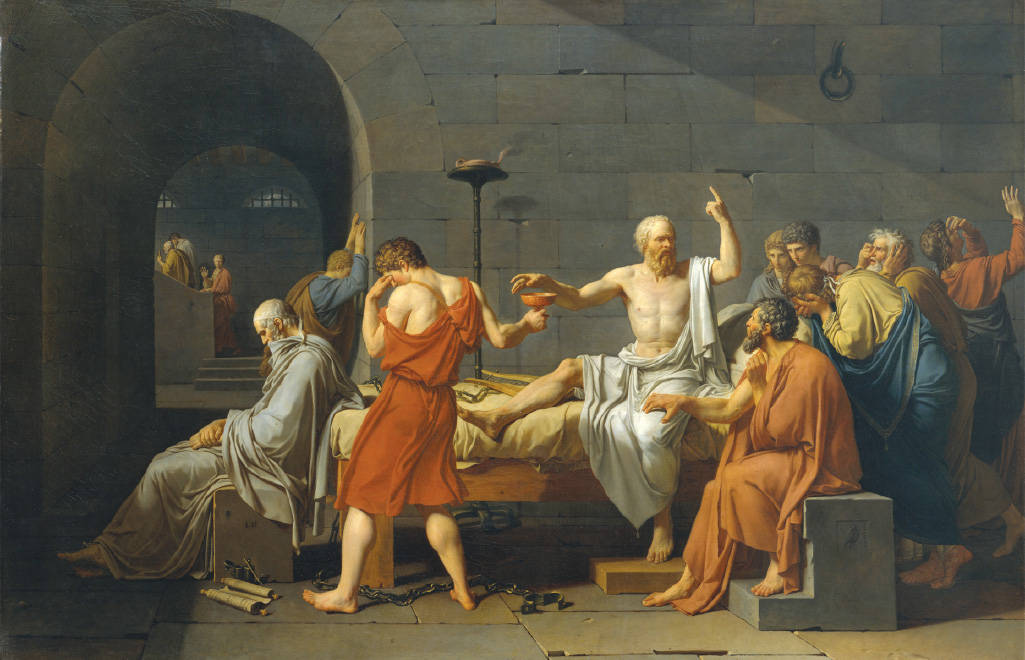The Greek Way of Knowing
The foundations of this Greek rationalism emerged in the three centuries between 600 and 300 B.C.E., coinciding with the flourishing of Greek city-states, especially Athens, and with the growth of its artistic, literary, and theatrical traditions. The enduring significance of Greek thinking lay not so much in the answers it provided to life’s great issues, for the Greeks seldom agreed with one another, but rather in its way of asking questions. Its emphasis on argument, logic, and the relentless questioning of received wisdom; its confidence in human reason; its enthusiasm for puzzling out the world without much reference to the gods—these were the defining characteristics of the Greek cultural tradition.
The great exemplar of this approach to knowledge was Socrates (469–399 B.C.E.), an Athenian philosopher who walked about the city engaging others in conversation about the good life. He wrote nothing, and his preferred manner of teaching was not the lecture or exposition of his own ideas but rather a constant questioning of the assumptions and logic of his students’ thinking. Concerned always to puncture the pretentious, he challenged conventional ideas about the importance of wealth and power in living well, urging instead the pursuit of wisdom and virtue. He was critical of Athenian democracy and on occasion had positive things to say about Sparta, the great enemy of his own city. Such behavior brought him into conflict with city authorities, who accused him of corrupting the youth of Athens and sentenced him to death. At his trial, he defended himself as the “gadfly” of Athens, stinging its citizens into awareness. To any and all, he declared, “I shall question, and examine and cross-examine him, and if I find that he does not possess virtue, but says he does, I shall rebuke him for scorning the things that are most important and caring more for what is of less worth.”13 (See Document 4.3 for a more extensive excerpt from this famous speech.)
The earliest of the classical Greek thinkers, many of them living on the Ionian coast of Anatolia, applied this rational and questioning way of knowing to the world of nature. For example, Thales, drawing on Babylonian astronomy, predicted an eclipse of the sun and argued that the moon simply reflected the sun’s light. He also was one of the first Greeks to ask about the fundamental nature of the universe and came up with the idea that water was the basic stuff from which all else derived, for it existed as solid, liquid, and gas. Others argued in favor of air or fire or some combination. Democritus suggested that atoms, tiny “uncuttable” particles, collided in various configurations to form visible matter. Pythagoras believed that beneath the chaos and complexity of the visible world lay a simple, unchanging mathematical order. What these thinkers had in common was a commitment to a rational and nonreligious explanation for the material world.

Such thinking also served to explain the functioning of the human body and its diseases. Hippocrates and his followers came to believe that the body was composed of four fluids, or “humors,” which caused various ailments when out of proper balance. He also traced the origins of epilepsy, known to the Greeks as “the sacred disease,” to simple heredity: “it appears to me to be nowise more divine nor more sacred than other diseases, but has a natural cause . . . like other afflictions.”14 A similar approach informed Greek thinking about the ways of humankind. Herodotus, who wrote about the Greco-Persian Wars, explained his project as an effort to discover “the reason why they fought one another.” This assumption that human reasons lay behind the conflict, not simply the whims of the gods, was what made Herodotus a historian in the modern sense of that word. Ethics and government also figured importantly in Greek thinking. Plato (429–348 B.C.E.) famously sketched out in The Republic a design for a good society. It would be ruled by a class of highly educated “guardians” led by a “philosopher-king.” Such people would be able to penetrate the many illusions of the material world and to grasp the “world of forms,” in which ideas such as goodness, beauty, and justice lived a real and unchanging existence. Only such people, he argued, were fit to rule.
Aristotle (384–322 B.C.E.), a student of Plato and a teacher of Alexander the Great, represents the most complete expression of the Greek way of knowing, for he wrote or commented on practically everything. With an emphasis on empirical observation, he cataloged the constitutions of 158 Greek city-states, identified hundreds of species of animals, and wrote about logic, physics, astronomy, the weather, and much else besides. Famous for his reflections on ethics, he argued that “virtue” was a product of rational training and cultivated habit and could be learned. As to government, he urged a mixed system, combining the principles of monarchy, aristocracy, and democracy.